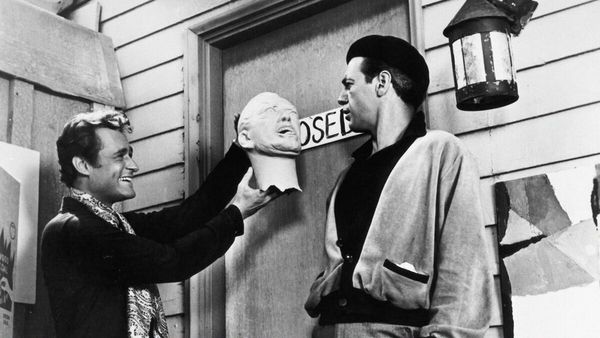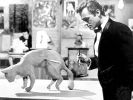Eye For Film >> Movies >> A Bucket Of Blood (1959) Film Review
A Bucket Of Blood
Reviewed by: Jennie Kermode

What do you want to be when you grow up? Many people have dreams that outstrip their abilities. Walter (Dick Miller) wants to be an artist. He hangs out in a popular beatnik café. He works hard to ingratiate himself with all the right people. But somehow it just doesn't happen - perhaps due to his complete lack of talent. Though he whines, he seems like a nice guy and we can empathise with his plight. But when he accidentally covers his landlady's cat in clay, his artistic career - and his personal behaviour - shift dramatically in a different direction.
On the one hand, this is slapstick comedy of the cheesiest kind. On the other, it's full of remarkably subtle observational humour, playing on its lurid premise to make vicious digs at the creative communities its writer, director and stars had themselves inhabited. It's not often that shrewd commentary on postmodern art and messy murders come together in a film, and one wouldn't expect them to do so as assuredly as this. The success of the film comes down to a perfect balance between the talents contributing to it, and the fact that Corman was essentially an A-list director whose ambition was to make his fortune by slumming it.

His Poe adaptations aside, this is undoubtedly one of the director's best works. It's beautifully shot in crisp black and white, and alongside the comedy it contains some truly chilling scenes. Everything is played absolutely straight so the horror is never diminished by knowing nods. Miller is superb in the central role, somehow managing to keep viewers rooting for him as he grows increasingly unhinged. Although there's scarcely a likeable character in the film, there are plenty of interesting ones, which makes it easier to recognise them as human beings and connect, through the laughs, with the real ugliness of Walter's actions (because to remain a success, he has to keep giving his fans something more).
Smart, playful and beautifully composed, this may not be the most famous of Corman's works but it's well worth rediscovering.
Reviewed on: 21 Mar 2012
















